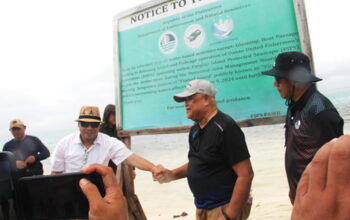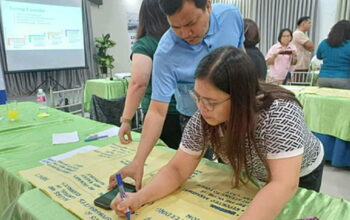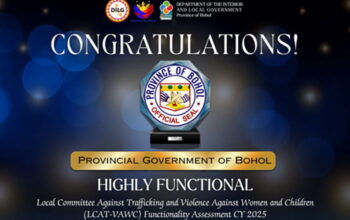
TAGBILARAN CITY, Bohol (PIA)—The voice of the people joined as one collaborating sector triumphed, as Tagbilaran City Mayor Jane C. Yap hit the shut-down button to finally kill the plan to reclaim 153 hectares parallel to the city’s coastlines.
As among the country’s Most Business-Friendly Cities, Tagbilaran City, tackled an unsolicited proposal to gain more prime real estate properties and significantly increase local revenues with the Tagbilaran City Waterfront Development Project.
Taking the City’s Public and Private Partnership (PPP) Ordinance, which was also patterned after the country’s laws and the Philippine Reclamation Authority’s guidelines, the city council started to tackle the proposal documents.
But as soon as the word about the reclamation project proposal leaked out, the empowered Tagbilaranons asserted its power, using the social and traditional media to castigate and criticize the city government for seemingly keeping the information from the people.
Earlier, Tagbilaran City tapped a United States Agency for International Development in piloting project that empowers the civil society to participate in executive and legislative decisions especially when it concerns the use of tax money.
Focusing in democratic governance, Tagbilaran City accessed foreign technical assistance in building open, responsive, and accountable institutions and processes that serve the needs and preferences of the public.
Set as a measure to assure people’s participation in governance, the widening of the playing field which allows the community to be heard, has also empowered citizens to take part in key government policies and decisions.
The project, in fact, peaked in convincing the City Government to open a space for civil society participation in local governance to make sure the underserved, under privileged and marginalized sectors can have a voice in how the city should govern.
“The City legislative body in the Sangguniang Panglunsod opened up its committee memberships to two more representatives from Civil Society Organizations operating in the city, these two members participate in governance and enjoy voting rights,” said SP Councilor and Housing and Urban Development Chair, Atty Nerio Zamora III.
With the issue of the reclamation which ultimately covers seagrass beds, reef areas and imperils the protected Mabaw Reef, environmentalists started to make noise, citing environmental impacts that could be irreversible, depriving more people of the right to enjoy nature.
“When we accepted the proposal, it does not mean that it would be built immediately, we accepted it to hear about the economic development opportunities that could also potentially increase our income,” Mayor Yap stated in a press statement.
As Tagbilaran City currently collects P84M in real property tax revenues, the mulled project can boost real property collection to P500M annually.
Business tax collection would consequently increase from P120M to somewhere between P800-900 million, not counting yet the 57,000 jobs that could be generated by the project.
Caught in a bind, instead of following the process in the PPP Ordinance which puts the Public Hearing and consultations in the final stages of the project, the city breaks protocol and scheduled public consultations.
From our series of public consultations, the people wanted to see the Environmental Impact Statement (EIS) [of the project], the first woman mayor of the city shared.
But, with the proposed project still in its beginning stages, the EIS has not been submitted.
With opposition to the project snowballing, the city government trashed the proposal.
“We will not continue with the activities related to the Tagbilaran City Waterfront Development Project, because we have a consultative and participative style of leadership,” the lady mayor announced during a press conference held at Café Dolores, November 24.
For the city, it conducted series of public consultations on the proposed project, down to the grassroots level, and people were more worried of the environmental impacts of the reclamation.
“My priority will always be our people and our natural environment. The city government of Tagbilaran will always listen to the voice of the people through its mission of consultative and participative governance,” she said.
“While we envision economic growth for Tagbilaran in order to provide more employment opportunities in our communities, we always consider the environmental impact of our economic policies and programs as a way to protect our rich natural resources for the future generations of Tagbilarananons,” she bared.
For environmentalists however, the triumph has to be sustained as the city’s Comprehensive Land Use Plan in 2018 lists down a reclamation as among the approved future development plans. (rahc/PIA-7/Bohol)



